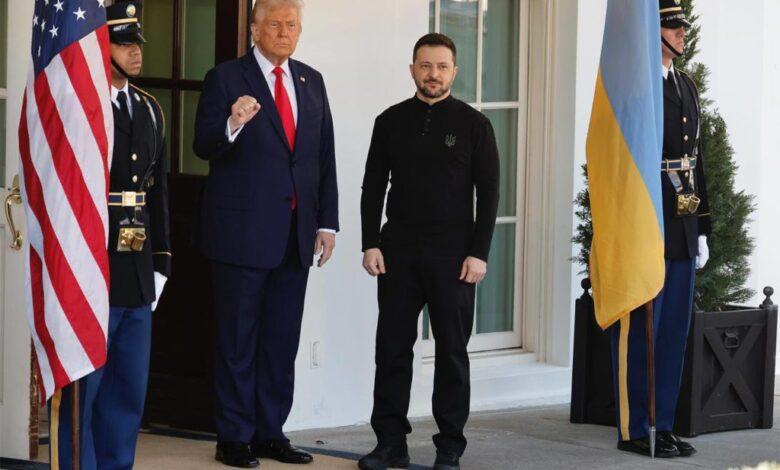Valeriy Chaly on the dress code: “the chain between the call due to violation of the protocol and the deterioration of bilateral relations is not so long”

The issue of the appearance of the President of Ukraine and Ukrainian official delegations has been repeatedly discussed both in the country itself and abroad. With the beginning of a full-scale war, the style of clothing of representatives of the authorities changed: strict suits and classic ties gave way to military style, which symbolizes that the country is in a state of war. This change causes an ambiguous reaction – part of the public and experts consider such a choice fully justified, as it emphasizes the realities in which Ukraine is and reminds the world that the war is ongoing. However, others point to the existence of international norms of diplomatic protocol, which are traditionally followed at official events, and which, in their opinion, should not be ignored.
The last visit of Volodymyr Zelenskyi to the USA again drew attention to this issue, causing a new wave of discussions in society. Should the president adhere to the classical standards of diplomatic dress code, or is he entitled to a derogation from the rules due to military circumstances? Can clothing really affect the course of negotiations and relations between countries? My opinion on this matter expressed former Ambassador Extraordinary and Plenipotentiary of Ukraine to the USA and experienced diplomat Valery Chaly. He explained in detail why the dress code is important in international politics, and what approaches to this issue Ukrainian official delegations should apply.
As the diplomat noted, the issue of clothing during official events is important, and it should be recognized. He emphasized that there are internationally recognized rules of diplomatic protocol and etiquette that remain in force.
As Valery Chaly emphasized, in Ukraine these rules are enshrined in normative documents, and even foreign guests usually follow them, showing respect for the country they are visiting. If specific circumstances arise, they should be agreed between the parties, according to the diplomat.
Speaking about the meaning of the dress code, Chaly emphasized five key points that it reflects:
- Willingness to act as equals without creating prior advantages.
- Showing respect to the host party.
- Demonstration of the external conditions in which the country is.
- A way to neutralize previous negative signals and the ability to send your own messages.
- The ability to combine comfort in the choice of clothes with compliance with international standards and respect for the partner.
According to Chaly, it is important to understand that the best option for Ukrainian delegations during the war would be to follow the host party’s protocol. These requirements are usually clearly stated in the preparation of the event, and for men this involves a formal suit and for women appropriate formal wear with possible accessories. An alternative option, in his opinion, can be a national dress – this is what representatives of India, Pakistan, Scotland, the Middle East and other countries do.
The diplomat also noted that if the Ukrainian delegation wants to emphasize that the country is in a state of war, but not to use accessories that could emphasize this situation (for example, ties, cufflinks, brooches, etc.), then a military-style embroidered shirt could be an option.
Chalyy also emphasized that, ideally, protocol services should warn the host party in advance about the specifics of the Ukrainian delegation’s dress code and agree on an acceptable option for all event participants. This would create a level playing field so that everyone feels comfortable and presentable to the media and an international audience.
As Valery Chaly emphasized, many may believe that the issue of the dress code has no influence on the outcome of the negotiations. But, according to him, this approach is wrong.
“If this is a delusion, then why all these textbooks and lectures to students? If it is a delusion, why is it being paid attention to? If it is a delusion, why such negative emotions and the attempt to take advantage of it in negotiations?”, – asks the diplomat.
In his opinion, deviation from diplomatic norms can be used as an additional argument in negotiations or cause tension in bilateral relations. He explained it with a clear example:
“Take the passport of Ukraine and put on a Scottish kilt (skirt), and then go, well, at least to the Office of the President of Ukraine.” – he noted, implying that non-compliance with the dress code can provoke misunderstandings and even conflict situations.
Chaly also addressed the employees of the State Security Department, noting that they already have enough duties during the war, so he does not call for changes to the security clearance rules. At the same time, he emphasized that the attitude towards such professional details in society should be changed.
“Because the chain between a call due to a violation of protocol and the deterioration of bilateral relations (of course, this is usually only a pretext or an additional reason) is not so long…” – concluded the diplomat.
For reference: Valery Oleksiyovych Chaly is a Ukrainian politician, diplomat, public figure and statesman. Extraordinary and Plenipotentiary Ambassador of Ukraine. Deputy Head of the Administration of the President of Ukraine (2014-2015). Ambassador Extraordinary and Plenipotentiary of Ukraine to the USA (2015-2019). Ambassador Extraordinary and Plenipotentiary of Ukraine to the Republic of Trinidad and Tobago on a part-time basis (2016—2019)





